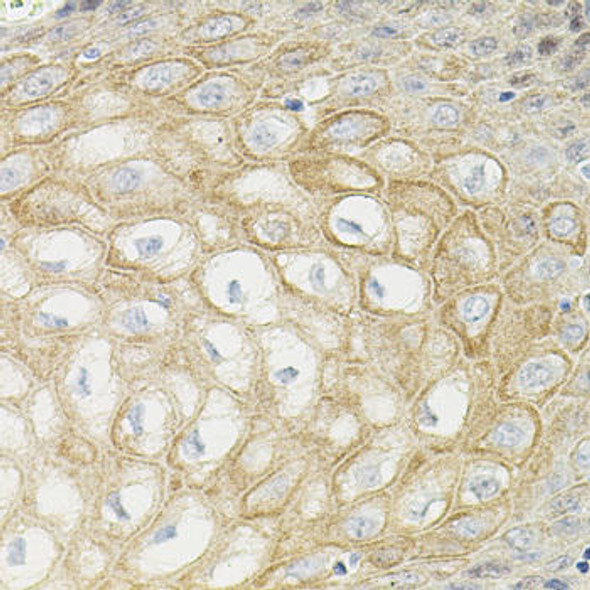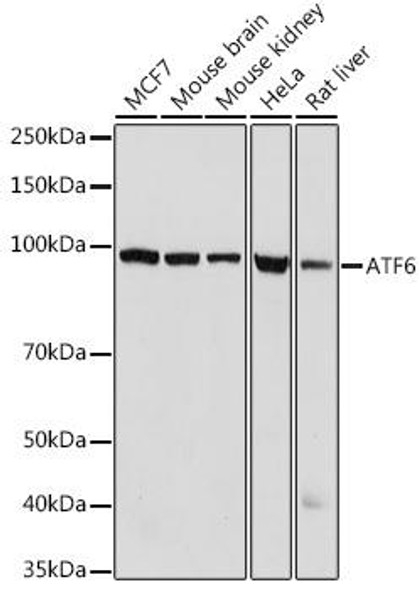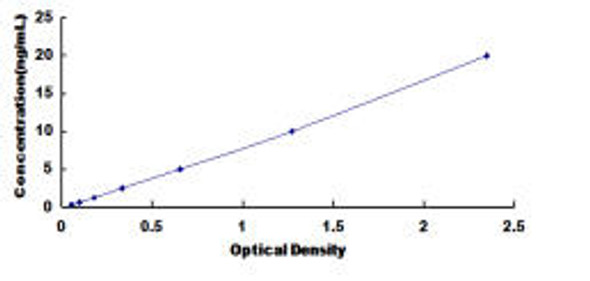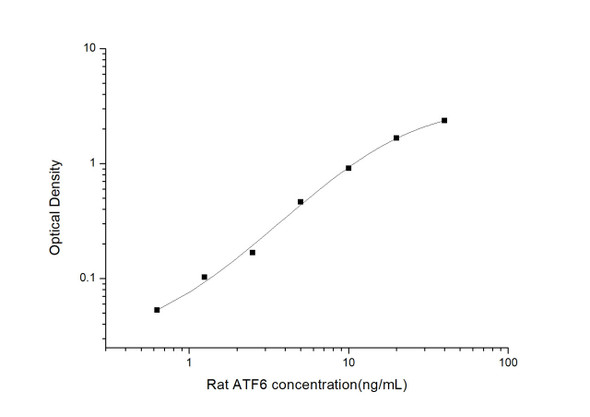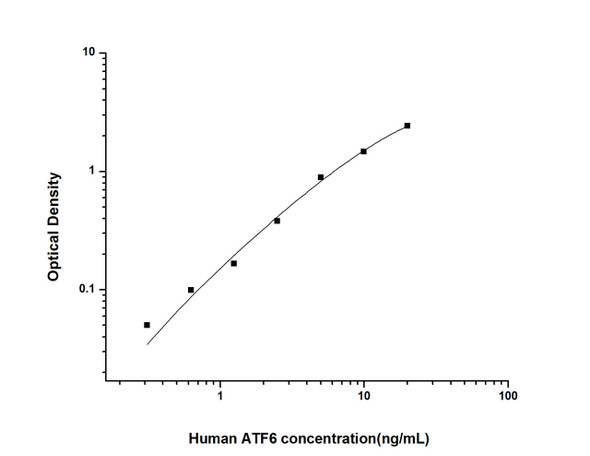ATF6 Antibody (PACO20991)
- SKU:
- PACO20991
- Product Type:
- Antibody
- Reactivity:
- Human
- Host Species:
- Rabbit
- Isotype:
- IgG
- Applications:
- ELISA
- IHC
- Antibody Type:
- Polyclonal Antibody
- Conjugation:
- Unconjugated
Description
ATF6 Antibody (PACO20991)
The ATF6 Polyclonal Antibody (PAC02091) is an essential tool for researchers studying ATF6, a key regulator of the unfolded protein response (UPR) pathway. Raised in rabbits, this antibody is highly specific to human ATF6 and has been validated for use in Western blot applications. By binding to ATF6 protein, this antibody allows for accurate and reliable detection and analysis in a variety of cell types, making it an ideal choice for studies in molecular biology and cellular stress response mechanisms.ATF6, a transcription factor involved in the UPR pathway, plays a crucial role in maintaining cellular homeostasis by regulating the response to endoplasmic reticulum (ER) stress.
Dysregulation of ATF6 has been associated with various diseases, including neurodegenerative disorders, diabetes, and cardiovascular disease. By gaining a better understanding of ATF6 function and regulation, researchers can potentially identify new therapeutic targets for the treatment of these conditions.Overall, the ATF6 Polyclonal Antibody is a valuable tool for researchers seeking to elucidate the role of ATF6 in cellular stress responses and disease pathogenesis. Its high specificity and reliability make it an excellent choice for studies aimed at uncovering the molecular mechanisms underlying ATF6-mediated stress signaling pathways.
| Antibody Name: | ATF6 Antibody (PACO20991) |
| Antibody SKU: | PACO20991 |
| Size: | 50ul |
| Host Species: | Rabbit |
| Tested Applications: | ELISA, IHC |
| Recommended Dilutions: | ELISA:1:1000-1:2000, IHC:1:10-1:50 |
| Species Reactivity: | Human |
| Immunogen: | Synthetic peptide of human ATF6 |
| Form: | Liquid |
| Storage Buffer: | -20°C, pH7.4 PBS, 0.05% NaN3, 40% Glycerol |
| Purification Method: | Antigen affinity purification |
| Clonality: | Polyclonal |
| Isotype: | IgG |
| Conjugate: | Non-conjugated |
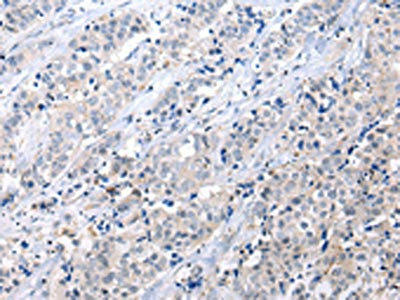 | The image on the left is immunohistochemistry of paraffin-embedded Human breast cancer tissue using PACO20991(ATF6 Antibody) at dilution 1/25, on the right is treated with synthetic peptide. (Original magnification: x200). |
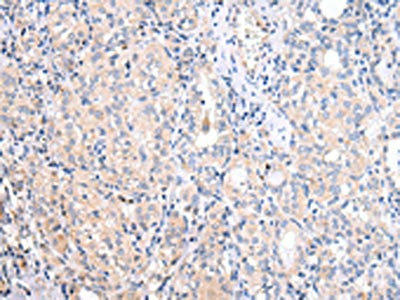 | The image on the left is immunohistochemistry of paraffin-embedded Human thyroid cancer tissue using PACO20991(ATF6 Antibody) at dilution 1/25, on the right is treated with synthetic peptide. (Original magnification: x200). |
| Background: | This gene encodes a transcription factor that activates target genes for the unfolded protein response (UPR) during endoplasmic reticulum (ER) stress. Although it is a transcription factor, this protein is unusual in that it is synthesized as a transmembrane protein that is embedded in the ER. It functions as an ER stress sensor/transducer, and following ER stress-induced proteolysis, it functions as a nuclear transcription factor via a cis-acting ER stress response element (ERSE) that is present in the promoters of genes encoding ER chaperones. This protein has been identified as a survival factor for quiescent but not proliferative squamous carcinoma cells. There have been conflicting reports about the association of polymorphisms in this gene with diabetes in different populations, but another polymorphism has been associated with increased plasma cholesterol levels. This gene is also thought to be a potential therapeutic target for cystic fibrosis. |
| Synonyms: | activating transcription factor 6 |
| UniProt Protein Function: | ATF6A: Transcription factor that acts during endoplasmic reticulum stress by activating unfolded protein response target genes. Binds DNA on the 5'-CCAC[GA]-3'half of the ER stress response element (ERSE) (5'-CCAAT-N(9)-CCAC[GA]-3') and of ERSE II (5'-ATTGG-N-CCACG-3'). Binding to ERSE requires binding of NF-Y to ERSE. Could also be involved in activation of transcription by the serum response factor. Belongs to the bZIP family. ATF subfamily. |
| UniProt Protein Details: | Protein type:Transcription factor; Membrane protein, integral Chromosomal Location of Human Ortholog: 1q23.3 Cellular Component: endoplasmic reticulum; endoplasmic reticulum membrane; Golgi apparatus; Golgi membrane; integral to endoplasmic reticulum membrane; membrane; nuclear envelope; nucleoplasm; nucleus Molecular Function:identical protein binding; protein binding; protein heterodimerization activity; transcription coactivator activity; transcription factor activity Biological Process: eye development; positive regulation of transcription of target genes involved in unfolded protein response; protein folding; regulation of transcription from RNA polymerase II promoter; response to stress; signal transduction; unfolded protein response; visual perception Disease: Achromatopsia 7 |
| NCBI Summary: | This gene encodes a transcription factor that activates target genes for the unfolded protein response (UPR) during endoplasmic reticulum (ER) stress. Although it is a transcription factor, this protein is unusual in that it is synthesized as a transmembrane protein that is embedded in the ER. It functions as an ER stress sensor/transducer, and following ER stress-induced proteolysis, it functions as a nuclear transcription factor via a cis-acting ER stress response element (ERSE) that is present in the promoters of genes encoding ER chaperones. This protein has been identified as a survival factor for quiescent but not proliferative squamous carcinoma cells. There have been conflicting reports about the association of polymorphisms in this gene with diabetes in different populations, but another polymorphism has been associated with increased plasma cholesterol levels. This gene is also thought to be a potential therapeutic target for cystic fibrosis. [provided by RefSeq, Aug 2011] |
| UniProt Code: | P18850 |
| NCBI GenInfo Identifier: | 66774203 |
| NCBI Gene ID: | 22926 |
| NCBI Accession: | P18850.3 |
| UniProt Secondary Accession: | P18850,O15139, Q5VW62, Q6IPB5, Q9UEC9, |
| UniProt Related Accession: | P18850 |
| Molecular Weight: | 74,585 Da |
| NCBI Full Name: | Cyclic AMP-dependent transcription factor ATF-6 alpha |
| NCBI Synonym Full Names: | activating transcription factor 6 |
| NCBI Official Symbol: | ATF6 |
| NCBI Official Synonym Symbols: | ACHM7; ATF6A |
| NCBI Protein Information: | cyclic AMP-dependent transcription factor ATF-6 alpha |
| UniProt Protein Name: | Cyclic AMP-dependent transcription factor ATF-6 alpha |
| UniProt Synonym Protein Names: | Activating transcription factor 6 alpha; ATF6-alpha |
| Protein Family: | Cyclic AMP-dependent transcription factor |
| UniProt Gene Name: | ATF6 |
| UniProt Entry Name: | ATF6A_HUMAN |
| Secondary Antibody |
| Anti-HRP Goat Anti-Rabbit IgG (H+L) Antibody (CABS014) |
| Recommended Products |
| Anti-FITC Goat Anti-Rabbit IgG (H+L) Antibody (CABS011) |
| Anti-HRP-conjugated Beta Actin Antibody (CABC028) |






